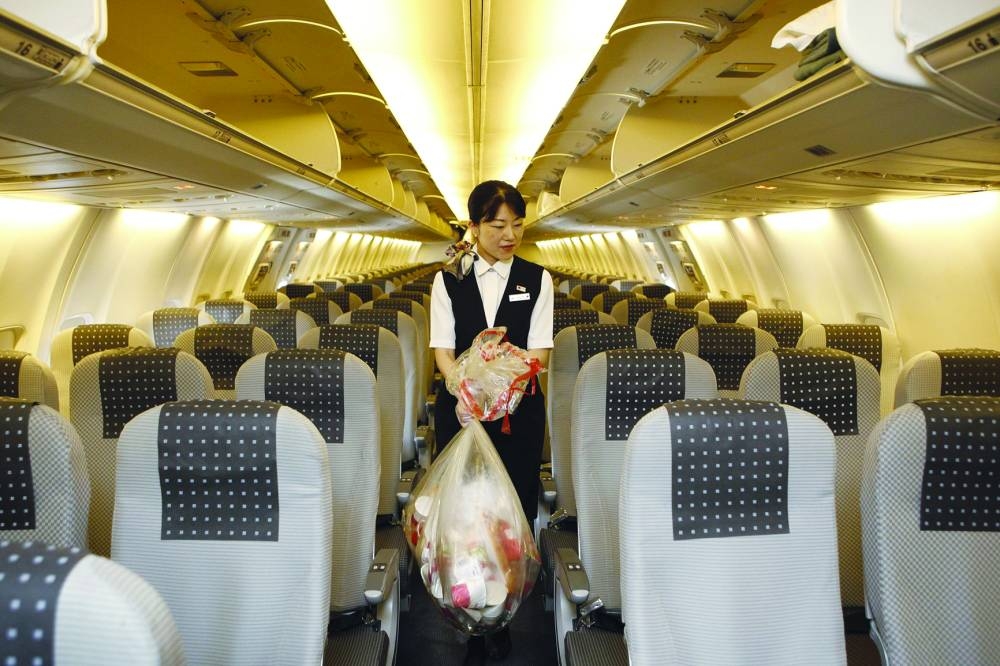Global airline industry has been found generating over 3.6mn metric tonnes of cabin and catering waste annually.
A bulk of this- 65% is food and beverage waste while untouched meals account for 18% of all waste, a recent audit undertaken by IATA and involving some 25 short, medium, and long-haul flights at Singapore’s Changi Airport has shown.
Cabin waste is generally made up of two main streams - cleaning waste and catering (galley) waste.
A growing challenge for airlines is the sustainable management of millions of tonnes of waste generated within the cabin. Cabin waste is costing airlines money, consuming valuable resources, and undermining the sector’s credibility on sustainable operations.
Cleaning waste is leftover rubbish from items given to passengers on the aircraft such as newspapers, paper towels, plastic bottles, food dropped on the floor, amenity kits and plastic wrapping from blankets, pillows and headsets.
Cleaning waste also includes the contents of washroom bins and medical waste such as used syringes.
Catering waste comes from inflight meals, snacks and beverages served to passengers and can consist of leftover food, drinks and packaging which is placed back in the trolleys, in static or compactor bins. This waste may contain high volumes of liquid from unconsumed beverages and ice.
That said, collecting waste on flights, especially long-haul international flights, and ensuring proper separation (recyclables, organic waste) is logistically complex.
Managing waste storage on aircraft and subsequent transport to appropriate disposal or recycling facilities poses logistical challenges, especially given the limited space on planes.
But major global airlines are taking steps to address the issue and good practices are clearly emerging within the sector.
IATA is collaborating with the Aviation Sustainability Forum (ASF) to launch a standardised Cabin Waste Composition Audit (CWCA), with the ASF Cabin Waste Composition Auditing Platform to be launched in September this year.
Audit data will guide the airline industry and policy makers in their efforts to reduce the levels of waste produced and improve circularity by identifying opportunities for re-use and re-cycling. Previous IATA research identified the lack of a standardised methodology with respect to conducting cabin waste audits and, as a result, harmonised data is not available to underpin decision-making by policymakers, airlines, and caterers regarding waste-related issues.
A standardised audit will help solve these issues and enable the sector to demonstrate progress towards waste reduction and improved circularity.
“Managing and reducing waste is an important component of aviation’s overall sustainability. Obtaining standardised and comparable data regarding the composition and quantity of waste from flights will help the industry to reduce the waste it generates. Better data will also help policymakers to harmonise regulations, which in turn can help optimise the industry’s capability to sort, re-cycle and safely re-use waste that cannot be avoided. Working with ASF in developing this audit programme is a significant step forward in improving the circularity of the sector,” said Marie Owens Thomsen, IATA’s senior vice-president (Sustainability) and chief economist.
“The ASF’s mission is to help the aviation sector reduce the levels of cabin waste generated and achieve higher levels of waste recovery and circularity. Working with IATA to develop a cabin waste composition auditing standard for the sector is a significant step forward. Effectively managing cabin waste is a challenge that can be solved with the backing of data. It is the responsibility of the sector and its regulators to come together, understand the problem and align on the needed solutions,” said Matt Crane, ASF’s founder.
The airline industry has been always the subject of criticism for inadequate cabin waste recycling, which threatens the sector’s environmental reputation.
A significant portion of cabin and catering waste often ends up in landfills, contributing to environmental degradation and greenhouse gas emissions.
With a huge growth in passenger numbers expected in the coming decade, the volume of cabin waste could more than double in the next 10 years!
This certainly calls for urgent action towards proper cabin waste recycling across the global airline industry.

A cabin attendant carries bags of trash as she conducts her cleaning duties in the cabin of a Japan Airlines airplane at Haneda Airport in Tokyo (file). A growing challenge for airlines is the sustainable management of millions of tonnes of waste generated within the cabin.

